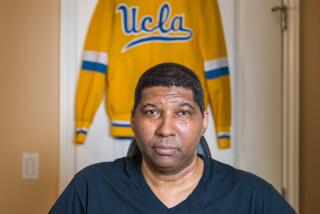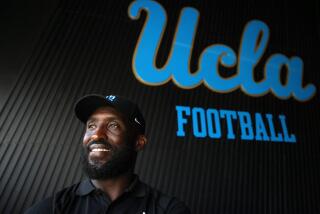Turning it to his advantage
- Share via
Two moments that showed what UCLA tailback Derrick Coleman could accomplish and what he had to overcome came before he was 3 years old.
“We had an Easter at his grandmother’s house when he was 1; the kids had to wait while we hid the eggs,” said May Hamlin, Coleman’s mother. “When it was time, Derrick just plowed through everyone, running over the other kids.
“His older cousin said right then, ‘That kid is going to be a football player.’ ”
Those run-to-daylight dreams were not a Point-A-to-Point-B journey. A little more than a year later, Coleman’s parents were concerned that his verbal skills were not developing. Tests revealed he had little to no hearing.
“When we found out, we went through all those thoughts, ‘How do we deal with this? What kind of life will he have?’ ” Coleman’s father, Derrick Sr., said. “Our heads were spinning. But I think there was a bit of relief in knowing.”
Relief has long since given way to joy.
Derrick, who has hearing aids for both ears, talks about dealing with his disability the same way he dealt with his fumble against Fresno State three weeks ago. Neither caused him to wallow in pity.
“I just went from being a child who never talked to one who never shuts up,” Coleman said, smiling. “Sometimes I felt a little out of place because I had a hearing aid. But at the same time, I did everything the other kids did.”
Usually even better.
Coleman, who is from Fullerton Troy High, is one of four freshman tailbacks UCLA brought in this year. He was able to leap frog that crowd despite having arthroscopic surgery on his knee in August and is the Bruins’ leading rusher even though he has played in only four of the team’s six games.
Said his father: “Derrick has never used his hearing as an excuse or a crutch. That is what I’m proudest about.”
------
Coleman suffered a minor knee injury early in training camp. The next day, he showed up on the practice field in full uniform ready to go before coaches ordered him back to the training room.
“You could see the desire in this kid from the first day,” UCLA offensive coordinator Norm Chow said.
Once he rehabilitated his knee, Bruins coaches got him into the tailback rotation.
In his second game, Coleman gained 86 yards in 10 carries against Fresno State. A week later, he churned out 49 in six carries against Washington State. He leads the Bruins with 171 yards rushing, averaging 6.1 yards a carry.
There have been a few glitches. He was overwhelmed by Arizona’s Ronnie Palmer while pass blocking and gave up a sack. Against Fresno State, the Bruins were driving for what might have been a go-ahead score in the fourth quarter when Coleman had the ball stripped and the Bulldogs recovered.
Call those setbacks speed bumps or part of the learning curve, but Coach Rick Neuheisel is impressed Coleman is “physically able to go in there and handle the game right now.”
Coleman has always been a fast-track player, once his parents let him loose on the field.
He begged to play flag football, and Hamlin said, “I finally let him and he catches the ball and starts running for a touchdown in his first game. I’m running down the sidelines at the same time, slipped and started rolling. After that, I didn’t have problems with him playing.”
Coleman wanted to move on to tackle football when he was in the sixth grade, because his sister was a cheerleader for a team. A year later, his father relented.
“I was concerned about his hearing aids and football being a contact sport, but he kept after me, so I said, ‘Let’s try it,’ ” Derrick Sr. said.
To stay under the maximum weight limit for his youth team, Coleman ate little but salads. “When he’d get tired of regular salad dressing, he’d put hot sauce on the salad,” Hamlin recalled.
When he reached high school and there were no more limits, weight or otherwise, Coleman was called “the Monster” by teammates as a freshman and was playing varsity as a sophomore. He gained 5,214 yards in his three-year career at Troy.
------
Coleman long ago began viewing his situation from a different perspective. Besides his hearing aid, Coleman learned to read lips. He was a high school freshman when that skill first came in handy on a football field.
“We were playing a game against our rivals, and we had the game won,” Coleman said. “Our coach was joking around and asked me if I could read the lips of the coach across the field.
“I looked over and could see exactly what play he was calling. We ended up intercepting a pass. I was like, ‘Wow, this is like having a super power.’ ”
Coleman’s hearing loss was caused by a recessive gene. His parents became proactive in getting their son to the proper doctors and programs.
The hearing aids were a big step. He began wearing them when he was 4 and was later outfitted with waterproof ones for football. He taught himself to read lips by focusing intently when his mother would talk to him.
“It was really tough at first because you wondered, ‘How will this affect his life?’ ” Derrick Sr. said. “But once he got the hearing aids, he took up the challenge of the disability and never looked back.”
When a high school Spanish teacher told Hamlin that her son would never learn the language, she knew better. Coleman worked harder and got a B. When kids would call him “stupid” because of how he talked, Hamlin would tell him, “Show them your report card and ask them if they are getting As and Bs.”
Nancy Adzovich, an audiologist who has worked with Coleman since he was a child, has seen the development from the beginning and saw his self-esteem grow.
She knew his story could help others. Last year, she asked Derrick and his mother to speak to a group of junior high and high school students who had hearing disabilities.
“As parents, teachers, audiologists, we can talk to kids and try to instill confidence,” Adzovich said. “It’s a whole different ballgame when Derrick gets up there and talks about kids making fun of him and how he dealt with it. He has such gifts to share. The kids keep asking me when Derrick is coming back.”
Said Coleman: “I told them don’t let anyone tell you what you can or cannot do. There are no limits.”
--
More to Read
Go beyond the scoreboard
Get the latest on L.A.'s teams in the daily Sports Report newsletter.
You may occasionally receive promotional content from the Los Angeles Times.







